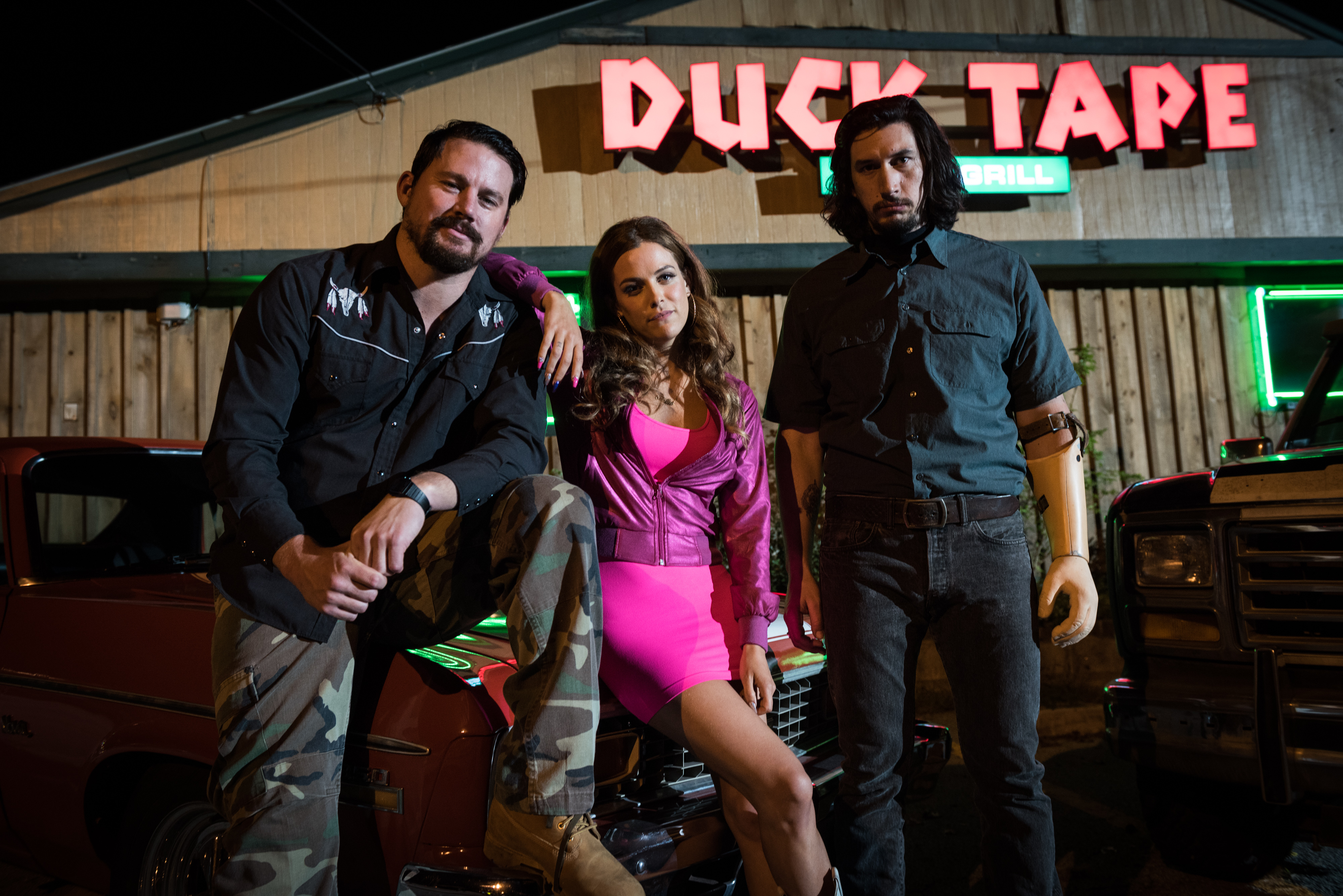Logan Lucky reminds us why we love heist movies
Steven Soderbergh knows how to make the off-kilter details of an elaborate robbery feel very satisfying


A free daily email with the biggest news stories of the day – and the best features from TheWeek.com
You are now subscribed
Your newsletter sign-up was successful
There's a moment early in Steven Soderbergh's Logan Lucky when Jimmy Logan, played by Channing Tatum, is called into his boss's office after a long day operating construction machinery fixing up the Charlotte Motor Speedway in North Carolina. The boss, in his best casual-yet-firm voice, asks Jimmy to shut the door behind him.
As Tatum does this, the slightest trace of a disappointed realization — an acknowledgment that he knows, as the audience does, what's about to happen — crosses his face. He's about to be let go, and sure enough, that's what happens. It's a stock situation. But not, somehow, a stock moment. Tatum so perfectly conveys his sudden dread, and the movie so steadfastly refuses to milk the aftermath of the act, that the predictability of shut the door/have a seat suddenly feels attentive, even, in its sad little way, alive.
That's Soderbergh's heist movie — and Soderbergh's approach to familiar movie genres — in a nutshell. Logan Lucky has a lot of recognizable ingredients, stuff that could even be broadly classified as clichés, but Soderbergh and his cast re-enliven them, sometimes by simply refusing to explain them to the audience.
The Week
Escape your echo chamber. Get the facts behind the news, plus analysis from multiple perspectives.

Sign up for The Week's Free Newsletters
From our morning news briefing to a weekly Good News Newsletter, get the best of The Week delivered directly to your inbox.
From our morning news briefing to a weekly Good News Newsletter, get the best of The Week delivered directly to your inbox.
Some of this involves toying with the mechanics of a heist movie. Jimmy, in a tight spot financially with an old football injury, no job, and an ex-wife (Katie Holmes) intent on moving their daughter (Farrah Mackenzie) out of state, reveals early on that he plans to rob his former employer. The full extent how Jimmy, his one-armed war-vet brother Clyde (Adam Driver), their speed-demon sister Mellie (Riley Keough), and local (incarcerated) explosives expert Joe Bang (Daniel Craig) will accomplish this is revealed only gradually, as the robbery is planned and, eventually, executed. Even then, a few key details take longer to emerge.
Doubling back narratives and sly twists are standbys of both heist movies and Soderbergh in entertainment mode. These two things previously converged in his all-star Ocean's trilogy, which manage to be both slick, crowdpleasing entertainment and deeply Soderberghian. Logan Lucky is almost more so on both counts. The characters are irresistible (and, unlike the Ocean's gang, not already well-off professionals) and the filmmaking is exacting — every pan, pivot, and cut is accounted for, yet stylish. Even the spontaneous-seeming moments move like clockwork.
But while the Ocean's movies teased out the eccentricity beneath their starry gloss, Soderbergh does something even bolder during certain passages of Logan Lucky: He avails himself to narrative clichés and dares to make them work again. The script, by mysterious newcomer Rebecca Blunt, is crisp and well-constructed, but plenty of its grace notes could have felt hoary, especially Jimmy's relationship with his young daughter. Doing it for the kids is nearly as creaky as going after "one last score," and giving Jimmy this motivation could easily unleash a torrent of sap.
Instead, Soderbergh has Tatum and Mackenzie underplay their scenes together, never goosing the drama. Jimmy's daughter is on the kid-pageant circuit, and rather than playing this for easy laughs, the movie regards her hobby with a kind of mild amusement. Jimmy obviously has some misgivings about pageants, as well as certain trappings of the modern world (he doesn't have a smartphone), but he never really lectures his kid, or the audience. The father and daughter just talk, with an affection and playfulness that leads, in the movie's final section, to a moment I found disarmingly moving — perhaps more so than anything else in Soderbergh's considerable filmography.
A free daily email with the biggest news stories of the day – and the best features from TheWeek.com
Yet Logan Lucky, like many of the director's best films, is a lot of fun, too. Soderbergh took a four-year break from directing movies that he called a retirement, and he's picked back up with the kind of genre exercise he was performing regularly before the break. Haywire was both a pulpy action movie and, with its casting of MMA fighter Gina Carano in the lead, an observation of a real athlete in graceful, brutal motion. Magic Mike found room for both the joy of male-stripper performance and the economic despair that fuels that lifestyle, rolled into a sort-of musical (when Matthew McConaughey takes the stage late in the movie, it's a move that's both wildly crowdpleasing and crazy desperate). In keeping with that pattern, Logan Lucky is a heist movie that reminds us why we like heist movies — why the off-kilter details of an elaborate robbery can feel so damn satisfying.
The unexpected common denominator between these three recent high-water marks is Channing Tatum, who Soderbergh has adopted as both a student and a muse, much like his work with George Clooney and Matt Damon. Even in his casting, Soderbergh takes something familiar — the hunky, humble leading man — and lends it offhand gravitas (he's since proved himself, but in his early roles Tatum felt a lot like a simulation of a movie star). The filmmaker who famously got Clooney to curb his head-nodding habit here keeps his actors from overplaying their hand, even when they're seeking sympathy or performing broad comic relief. That extends to the movie's economic-revenge angle, too, which manages to evoke the frustrations and aspirations of blue-collar work rather than pure white disgruntlement.
Even more than other auteurs in the one-for-them/one-for-me era, Soderbergh has made a surprising number of hits chased by a substantial number of flops and obscurities. He's made great movies in both categories, but with Logan Lucky, Soderbergh the studio-movie entertainer and Soderbergh the clinical, experimental stylist fully merge. As with Haywire and Magic Mike, and arguably much more crowdpleasing, he's made a movie more precision-tooled than its old-school counterparts yet still steeped in the pleasures of genre. He's back doing some of the best work of his career making old stuff look shiny and new.
Jesse Hassenger's film and culture criticism has appeared in The Onion's A.V. Club, Brooklyn Magazine, and Men's Journal online, among others. He lives in Brooklyn, where he also writes fiction, edits textbooks, and helps run SportsAlcohol.com, a pop culture blog and podcast.
-
 How Democrats are turning DOJ lemons into partisan lemonade
How Democrats are turning DOJ lemons into partisan lemonadeTODAY’S BIG QUESTION As the Trump administration continues to try — and fail — at indicting its political enemies, Democratic lawmakers have begun seizing the moment for themselves
-
 ICE’s new targets post-Minnesota retreat
ICE’s new targets post-Minnesota retreatIn the Spotlight Several cities are reportedly on ICE’s list for immigration crackdowns
-
 ‘Those rights don’t exist to protect criminals’
‘Those rights don’t exist to protect criminals’Instant Opinion Opinion, comment and editorials of the day
-
 Walter Isaacson's 'Elon Musk' can 'scarcely contain its subject'
Walter Isaacson's 'Elon Musk' can 'scarcely contain its subject'The latest biography on the elusive tech mogul is causing a stir among critics
-
 Welcome to the new TheWeek.com!
Welcome to the new TheWeek.com!The Explainer Please allow us to reintroduce ourselves
-
 The Oscars finale was a heartless disaster
The Oscars finale was a heartless disasterThe Explainer A calculated attempt at emotional manipulation goes very wrong
-
 Most awkward awards show ever?
Most awkward awards show ever?The Explainer The best, worst, and most shocking moments from a chaotic Golden Globes
-
 The possible silver lining to the Warner Bros. deal
The possible silver lining to the Warner Bros. dealThe Explainer Could what's terrible for theaters be good for creators?
-
 Jeffrey Wright is the new 'narrator voice'
Jeffrey Wright is the new 'narrator voice'The Explainer Move over, Sam Elliott and Morgan Freeman
-
 This week's literary events are the biggest award shows of 2020
This week's literary events are the biggest award shows of 2020feature So long, Oscar. Hello, Booker.
-
 What She Dies Tomorrow can teach us about our unshakable obsession with mortality
What She Dies Tomorrow can teach us about our unshakable obsession with mortalityThe Explainer This film isn't about the pandemic. But it can help viewers confront their fears about death.
